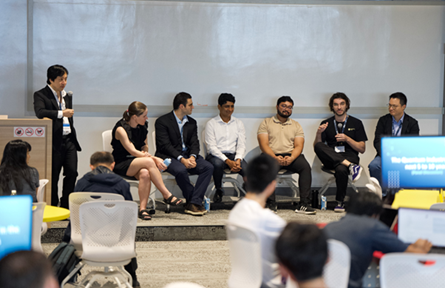Tailoring Nanoscale Systems by a bottom-up design Atom-by-Atom by Prof Roland Wiesendanger
IAS STEM Graduate Colloquium Jointly Organised with the Graduate Students' Clubs

Held on 12 July 2023 via zoom, the webinar titled “Tailoring Nanoscale Systems by a bottom-up design Atom-by-Atom” featuring the acclaimed Prof Roland Wiesendanger from University of Hamburg, Germany was organised by IAS@NTU and the Graduate Students’ Clubs of the School of Physical & Mathematical Sciences and School of Materials Science and Engineering. The colloquium blended dissemination of basics of Scanning Tunnelling Microscopy (STM) with a review of Prof Wiesendanger’s work on the forefront of this field.
STMs help image surfaces with atomic level resolution by using an extremely sharp conducting tip. They offer unprecedented control and help image or even manipulate individual atoms.
The talk began with Prof Wiesendanger giving a brief introduction to the working mechanism of Scanning Tunnelling Microscopy and how it enables the study of nanoscale spin systems. His judicious use of animations made the concepts clear to the audience. He then delved into how coating the sharp STM-tip with a magnetic material leads to the advent of Spin-polarized STM which aids the study of Ferromagnetic and Antiferromagnetic systems.

Next, he talked about how atomic level resolution of spins in real space can be achieved with the help of his work on Magnetic exchange force microscopy. After a brief discussion on realising all-spin-based logic operations using spin-resolved STM, he concluded by analysing the potential of tailored spin systems for topological quantum computation.
A lively interactive Q&A session ensued where the students actively discussed some of their queries. Prof Wiesendanger was very forthcoming and answered questions on topics ranging from his work to general queries on getting into research. The answers were very insightful and were widely appreciated by the audience.
"It was interesting to see how single atom manipulation can be used to fabricate transistors at an atomic scale. Looking forward to the future prospects of this technology, especially if it can be used industrially and with semiconductors still in huge demand globally" - Choong Li Yan Anthony (MSE PhD student)
"I enjoy the concepts that help me learn more about other fields" - Feng Zijian (IGP-ICRM PhD student)
"Exposes me to what is at the cutting edge although it is not directly in my field of research" - Chen Qi Jing (MAE PhD student)
Written by Navaratna Nikhil | SPMS GSC














/enri-thumbnails/careeropportunities1f0caf1c-a12d-479c-be7c-3c04e085c617.tmb-mega-menu.jpg?Culture=en&sfvrsn=d7261e3b_1)

/cradle-thumbnails/research-capabilities1516d0ba63aa44f0b4ee77a8c05263b2.tmb-mega-menu.jpg?Culture=en&sfvrsn=1bc94f8_1)






